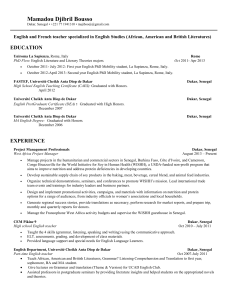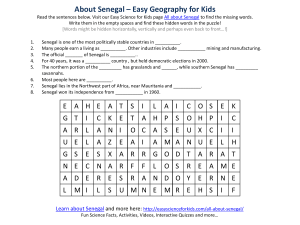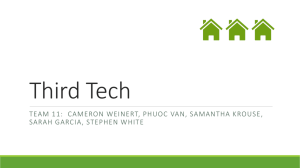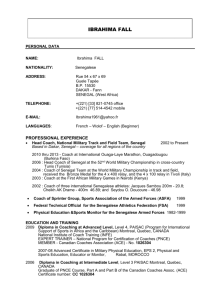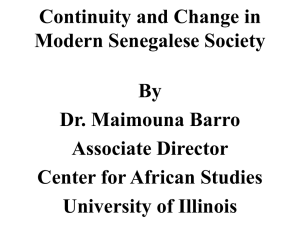Oil and Regional Development in Chad Impact Assessment
advertisement
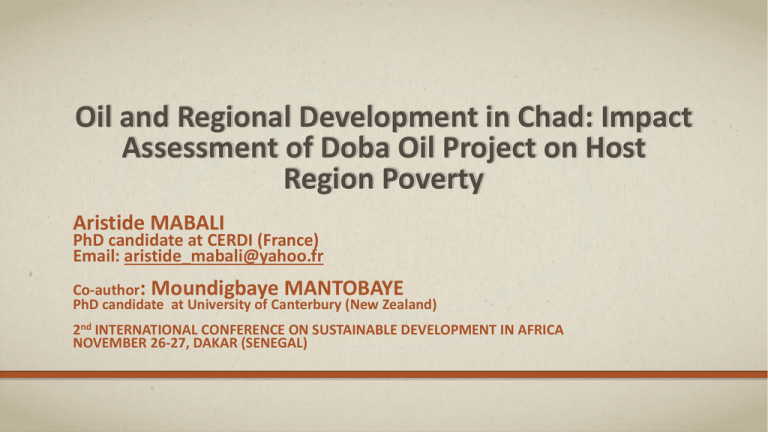
Oil and Regional Development in Chad: Impact Assessment of Doba Oil Project on Host Region Poverty Aristide MABALI PhD candidate at CERDI (France) Email: aristide_mabali@yahoo.fr Co-author: Moundigbaye MANTOBAYE PhD candidate at University of Canterbury (New Zealand) 2nd INTERNATIONAL CONFERENCE ON SUSTAINABLE DEVELOPMENT IN AFRICA NOVEMBER 26-27, DAKAR (SENEGAL) PLAN • Introduction • Theoretical framework • Advantages received by the oil producing Region • Empirical Strategy • Conclusion and Recommendations 2nd International Conference on Sustainable Development in Africa, November 26-27, Dakar (Senegal) INTRODUCTION • Law N° 001/PR/1999 established rules for allocating and managing oil revenues in Chad: • 90% of direct revenues (dividends and royalties) would be allocated as following: • 80% for financing priority sectors as defined by the public authorities • 15% for operational expenditures • 5% for oil-producing region to help it plan its development (Article 211 of the Chadian Constitution) • 10% for future generations • According to world Bank, this oil project is a « project model for a developing country » 2nd International Conference on Sustainable Development in Africa, November 26-27, Dakar (Senegal) INTRODUCTION • Oil-producing region (Logone Oriental) has received three types of advantages: • its share of oil revenues as defined by the law N°001/PR/1999 • individual and community compensations • job programs for natives from oil-producing Region • Objectives of this paper • We are interested by effects of the system put in place to mitigate the negative impacts of oil exploitation on oil-producing region • What is the poverty profile in oil-producing region compared to others regions? 2nd International Conference on Sustainable Development in Africa, November 26-27, Dakar (Senegal) Theoretical framework 2nd International Conference on Sustainable Development in Africa, November 26-27, Dakar (Senegal) THEORETICAL FRAMEWORK • What are motivations of regional discrimination? • Economic motivations • Political motivations • Environmental motivations • Social motivations 2nd International Conference on Sustainable Development in Africa, November 26-27, Dakar (Senegal) ECONOMIC MOTIVATIONS Is there the resource curse at county level? Stagnation in the agricultural sector (Ross, 2003) - Workers sectorial reallocation - The agriculture matters in poverty reduction in developing countries Inflation - Economic migration (Frynas, 2004) - Massive inflow of financial resources The Chadian oil is onshore (800 well drilling and 1,076 km of pipeline) - Reduction of the arable land area and destruction of fields The loss of economic assets 2nd International Conference on Sustainable Development in Africa, November 26-27, Dakar (Senegal) ECONOMIC MOTIVATIONS • Several papers have evaluated effects of oil exploitation at the local economy level • Postali (2009) evaluates the effects of royalties distributed to Brazilian municipalities to contribute for their development • James and Aadland (2011) The resource curse holds at the local level using U.S. states • Postali and Nishijima (2013) royalties distributed had a positive and statistically significant impact on household’s access to social services (electricity, piped water, waste collection, the decrease of illiteracy rate, …) • Finally, these studies seem to confirm the existence of the resource curse at the local economy level 2nd International Conference on Sustainable Development in Africa, November 26-27, Dakar (Senegal) POLITICAL MOTIVATIONS Oil is a source of political and social conflicts (Collier and Hoeffler, 2004; 2005; Acemoglu et al., 2011) Central government is the only agent for the collection and redistribution of oil revenues - The appropriation and the control of resources - Conflicts are concentrated around resource rich regions of resource (Ellis 1998; Keen, 2003; Ikelegbe, 2005) Oil produces social inequalities and underdevelopment in riverside communities (Idemudia, 2009a, 2012) - The violence and the crime become a response to the perceived injustice of not benefiting from their own resources 2nd International Conference on Sustainable Development in Africa, November 26-27, Dakar (Senegal) POLITICAL MOTIVATIONS • The Niger Delta is frequently cited as evidence of the pervasiveness of local community protests for resources control (Idemudia, 2014) • In Liberia, rival factions struggled to control the main diamond and gold producing areas (Ellis 1998; Keen, 2003) • The protests for “resource control” in producing regions transformed in struggles for independence: Sudan, Congo DRC, Angola, Nigeria • Armed conflicts of 1997-1999 in the oil-producing region in Chad were related to the oil project 2nd International Conference on Sustainable Development in Africa, November 26-27, Dakar (Senegal) ENVIRONMENTAL MOTIVATIONS Oil exploitation generates environmental negative effects (Lipscomb et al., 2012; White, 2012; Atkin, 2014) Chad’s oil project is onshore (800 well drilling and 1,076 km of pipeline) - The loss of biodiversity (flora and fauna) Risk of contamination of ground water, accidental chemical spills, reduction in air quality Recent quarrels between the Chadian government and the Chinese oil company CNPCIC on the spill of chemical waste 2nd International Conference on Sustainable Development in Africa, November 26-27, Dakar (Senegal) SOCIAL MOTIVATIONS Oil projects are likely to generate major negative social effects on the populations living in the producing area Social inequalities (Sala-iMartin and Subramania, 2003, Segal, 2011). Acceleration of existing tensions between herders and farmers Depravity of manners (prostitution, crime and banditry...) Emergence of abusive consumption of temptation goods (Bryceson, 2002; Akyeampong, 2002; Grätz, 2002, 2003) HIV prevalence is estimated at 9.8% in the region of Logone Oriental - national average (3.3%), (CNLS, 2014) “Heavy drinking cultures” : Consumption of alcohol becomes the main leisure and dominant lifestyle (Bryceson, 2002) 2nd International Conference on Sustainable Development in Africa, November 26-27, Dakar (Senegal) Advantages received by the oil producing Region 2nd International Conference on Sustainable Development in Africa, November 26-27, Dakar (Senegal) 5% OF OIL REVENUES • The management of these financial resources is ensured by the «Comité Provisoire de Gestion des Revenus Pétroliers – CPGRP» • From 2004 to 2012, Logone oriental received around US$ 104,977,000 • The use of these resources: • 80.58% for construction of social infrastructures (schools, hospitals, water wells) • 13.70% for construction of other infrastructures (market, electricity, stadiums …) • 4% for financing of microcredit program • The rest (1.36%) for financing of Solidary Fund (regional stabilization fund) 2nd International Conference on Sustainable Development in Africa, November 26-27, Dakar (Senegal) COMPENSATIONS • Individual compensations: The uses of land are compensated (Chadian law) • US$ 972 per mango tree destroyed • Individual compensations have varied from US$ 5,000 U.S to US$ 8834 • A total of 5.5 million U.S. dollars • Community compensations: counterparts of fauna and flora destroyed • They are used to finance diverse infrastructures (schools, housing for some village chiefs, well water...) 2nd International Conference on Sustainable Development in Africa, November 26-27, Dakar (Senegal) Empirical Strategy 2nd International Conference on Sustainable Development in Africa, November 26-27, Dakar (Senegal) DATA SOURCES • «Survey on Consumption and the Informal Sector in Chad» carried out in 2003 (ECOSIT2) and 2011 (ECOSIT3) • These surveys aimed to establish the poverty profile in Chad • Same methodology for ECOSIT 2 and ECOSIT 3 Data comparables • Their geographical coverage is the nationwide. 2nd International Conference on Sustainable Development in Africa, November 26-27, Dakar (Senegal) IDENTIFICATION STRATEGY • The poverty status may depend of observed and unobserved characteristics • Challenge: To construct an appropriate counterfactual model • Difference-in-Differences (DID) estimator • Propensity score methods (Rosenbaum and Rubin, 1983) • We combine PS-matched and DID (Hirano and Imbens, 2002 and Hirano et al, 2003) 2nd International Conference on Sustainable Development in Africa, November 26-27, Dakar (Senegal) VARIABLES AND DESCRIPTIVE STATISTICS • Monetarypovertyindicators (Foster, Thorbecke and Greer, 1984)) • The poverty line corresponded to a daily expenditure of $ US 0.70 per capita in 2003 and $US 1.10 in 2011 (official) • Poverty incidence (𝑃0 ), Poverty gap (𝑃1 ) 𝑎𝑛𝑑 Poverty severity (𝑃2 ) • They are appreciated due to their interesting proprieties (Ravallion, 1996; Boccanfuso and Kaboré, 2008; Alkire and Foster, 2011) • They have been used by Chadian authorities to develop the National Poverty Reduction Strategies 2nd International Conference on Sustainable Development in Africa, November 26-27, Dakar (Senegal) VARIABLES AND DESCRIPTIVE STATISTICS • Multidimensional Poverty Index (privation approach) - Alkire and Santos (2010) • 9 indicators corresponding to the same 3 dimensions as the Human Development Index: • Education (Literacy and Attendance) • Health (Physical health and response to a health problem) • Standard of Living (Electricity, water, sanitation, cooking fuel, floor, assets) • Each dimension is equally weighted and each indicator within a dimension is also equally weighted • A household is identified as multidimensionally poor if, and only if, it is deprived in some combination of indicators whose weighted sum is 30 percent or more of the dimensions 2nd International Conference on Sustainable Development in Africa, November 26-27, Dakar (Senegal) VARIABLES AND DESCRIPTIVE STATISTICS • Other variables • Unemployment • Food expenditures (per capita) • Expenditures on clothing • Housing expenditures • Alcohol expenditures • Health expenditures • Education expenditures • Furnishing expenditures • Leisure expenditures 2nd International Conference on Sustainable Development in Africa, November 26-27, Dakar (Senegal) VARIABLES AND DESCRIPTIVE STATISTICS 2nd International Conference on Sustainable Development in Africa, November 26-27, Dakar (Senegal) RESULTS AND INTERPRETATIONS 2nd International Conference on Sustainable Development in Africa, November 26-27, Dakar (Senegal) RESULTS AND INTERPRETATIONS • The monetary poverty indicators are positively and statistically significant at the 1% level (kernel matched and PS weighted DID) • Especially, the proportion of the poor increased by 19.3% in Logone oriental compared to control regions over the period 2003-2011 • The poverty gap that measures the gap of consumption expenditures of poor households compared to the poverty line increased by 9.6% in the oil producing Region compared to control regions • There is an increase of inequalities by 5.6% between poor and non-poor households • The employment situation also hasn’t improved in the oil producing Region compared to control regions 2nd International Conference on Sustainable Development in Africa, November 26-27, Dakar (Senegal) RESULTS AND INTERPRETATIONS • The number of households deprived in dimensions of our index (health, education and standard of Living) has not improved in Logone oriental compared to control regions • The increase of poverty in the oil producing Region is associated with a significant reduction in food, education, leisure, housing and furnishing expenditures • Household alcohol expenditures increased in Logone oriental compared to control regions • These results show that Logone oriental experienced the oil curse the system put in place to mitigate the oil negative impacts didn't produce the expected outcome 2nd International Conference on Sustainable Development in Africa, November 26-27, Dakar (Senegal) ROBUSTNESS TESTS • One threat to the validity of our results: Stable Unit Treatment Value Assumption (SUTVA) • geographic spillovers associated with oil project • For example, Weinstein (2012) finds evidence of significant spatial spillovers about shale boom counties across the U.S. counties • The violation of SUTVA is a source of estimation bias • We re-estimate our baseline model by dropping out all neighboring regions of the Logone oriental Region • Our identification strategy is closer to those used by Weber (2012) 2nd International Conference on Sustainable Development in Africa, November 26-27, Dakar (Senegal) ROBUSTNESS TESTS 2nd International Conference on Sustainable Development in Africa, November 26-27, Dakar (Senegal) ROBUSTNESS TESTS • The only major change occurs in the magnitude of interest coefficients • The coefficients associated to the incidence of monetary poverty estimated by the kernel matched and PS weighted DID are about 40% higher than those estimated on total sample • The difference in magnitude of coefficients associated to household expenditures is ranked from 7% to 32%, except for alcohol consumption expenditures (176%) • The coefficient of the unemployment variable becomes significant at the 10% level • These results seem to show that there are spillover effects of negative impacts • Neighboring regions to the oil producing area are more likely to experience the natural resource curse 2nd International Conference on Sustainable Development in Africa, November 26-27, Dakar (Senegal) CONCLUSION AND RECOMMENDATIONS • The incidence, gap and severity of monetary poverty increased in the oil producing Region compared to control regions • No evidence that the nonmonetary poverty decreased in the oil producing Region, as the important investments in social infrastructures could have suggested • Household expenditures for temptation goods increased in this region compared to control regions • There are spillover effects of negative impacts • The neighboring regions of oil producing Region are more likely to experience the poverty • These results raise the issue of expansion of this law to oil fields newly discovered 2nd International Conference on Sustainable Development in Africa, November 26-27, Dakar (Senegal) Thank you for your interest! 2nd International Conference on Sustainable Development in Africa, November 26-27, Dakar (Senegal)
